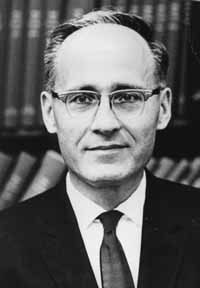Philip H. Phenix, Proponent of Education for Reverence, Dies at Age 87
He died at the home of his son and daughter-in-law, Morgan Scott and Betty Phenix, in Stanley, Virginia, after a short illness. Dr. Phenix was 87.
Philip Phenix, who was a member of the Teachers College faculty from 1954 through 1981, acquired notoriety in 1934 when, at age 19, the senior thesis he wrote on "The Absolute Significance of Rotation" while at Princeton University, was praised by Albert Einstein and reported on in The New York Times (July 26, 1934). Einstein, who wrote to the then mathematics major's professor expressing his desire to speak with Phenix in detail, commented that "The clarity with which this young man has grasped this problem is astonishing, as is his mastery of the formal apparatus."
The University offered the graduate a position in the Department of Theoretical Physics. Instead, he took a position with Metropolitan Life Insurance, and in 1939 was elected Fellow in the American Actuarial Society, becoming the youngest Fellow at the time, according to his son Roger Phenix.
He left Metropolitan Life to pursue further studies at Union Theological Seminary in New York. After receiving a Master's degree in Divinity in 1942, he became a chaplain in the U.S. Army and an Air Force meteorologist during World War II.
For seven years after leaving the military, Philip Phenix joined Carleton College in Northfield, Minnesota, first as College Chaplain and professor in the Department of Philosophy and Religion and for the last two years as Dean of the College.
In 1950, he received a Ph.D. in Philosophy of Religion from Columbia University, and in 1954, joined the faculty of Teachers College. While at Teachers College, Dr. Phenix wrote and spoke about religion's role in publicly supported institutions.
He said teachers who possess reverence for the wondrous diversity of nature and for the uniqueness and potential embodied in individual selves, help students to form integrated life styles "in a world of meanings that the human spirit discovers are its native home...The inculcation of reverence," he said, "is the root of wisdom and virtue."As the author of eight books, including Realms of Meaning, Man and His Becoming, Education and the Worship of God, and Education and the Common Good, many of which were translated into several different languages, Dr. Phenix demonstrated religion's inherent presence in each major subject taught in the general curriculum.
"The average person believes truth is science," he said. "The challenge to education is to recognize the feeling of aesthetics, the wonder of religion, and ethics are an integral partner in knowing." A world defined by the sciences, he said, is not attractive enough to motivate students to strive for their potential.
In Realms of Meaning and in Ways of Knowing, Phenix asks that religious values, universal values, inform the teacher's reverence for the student; in the classroom, the student "is able to participate in a world of meanings that the human spirit discovers are its native home." The student learns how to go about truly living life as part of the human community. Most of Phenix's books are about integrating all the disciplines. Religion, the absolute, the final meaning, is for him the ultimate reason to bring all these disciplines together.
Intelligible Religion, Harper and Brothers, 1954
Philosophy of Education, 1958 Henry Holt and CompanyReligious Concerns in Contemporary Education (1959)
Education and the Common Good A Moral Philosophy of the Curricullum, 1961, Harper & Bros.Man and His Becoming, 1964, Rutgers University PressRealms of Meaning, A Philosophy of the Curriculum for General Education, McGraw-Hill, 1964Education and the Worship of God, 1966,Westminster PressPublished Saturday, Jul. 27, 2002
